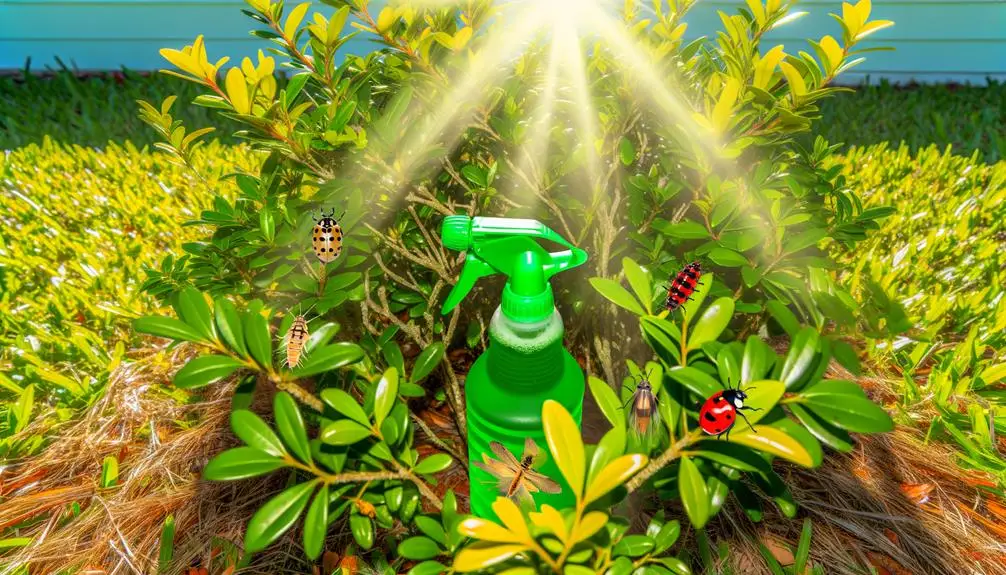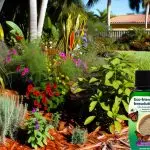To get rid of aphids naturally in your South Florida shrubs, start by spraying them with water to dislodge the pests. For added power, use homemade organic sprays, like a mixture of liquid soap or garlic steeped in water. Encourage beneficial insects like ladybugs and lacewings, which feast on aphids. Implement companion planting with herbs like garlic and mint to repel them. Regular monitoring and maintaining healthy plants by pruning and avoiding excess nitrogen can deter infestations. Stay vigilant, and you’ll keep your shrubs thriving. There’s more to explore about effective strategies for a flourishing garden.
Key Takeaways
- Regularly inspect shrubs for signs of aphids, such as clusters on leaves and honeydew residue.
- Use effective water sprays targeting the undersides of leaves to dislodge aphids.
- Apply homemade organic sprays like liquid soap, garlic, or hot pepper solutions every 4-7 days.
- Encourage beneficial insects like ladybugs and lacewings by planting diverse flowers and herbs.
- Maintain healthy shrubs through proper watering and pruning to deter aphid infestations.
Understanding Aphids
Aphids are small, pear-shaped insects that can wreak havoc on your garden. These nuisances come in various colors, from green to black, and are often found sucking the sap from tender new growth on your plants. They reproduce rapidly through a process called parthenogenesis, which means their populations can explode in no time, making control methods tricky. Understanding these insects is vital for any gardener wanting to maintain a healthy landscape. To effectively manage aphids, consider using organic pest control methods that minimize chemical exposure and promote environmental health.
One of the main issues with aphids is the sticky substance they secrete, known as honeydew. This not only creates a mess but also leads to the growth of sooty mold on your plants, which can hinder photosynthesis. You’ll also want to be aware that aphids can transmit harmful plant diseases, making it important to tackle them before they get out of hand.
To combat aphids, consider inviting natural predators into your garden. Ladybugs and lacewings are excellent allies, as they feast on these pests. Additionally, practicing companion planting with fragrant herbs can help repel aphids, keeping your shrubs protected. Regularly inspecting your plants for early signs of aphid activity can make a big difference in preventing infestations. Finally, make sure your plants receive proper nutrition and aren’t overcrowded, as a healthy garden is less appealing to aphids. By taking these steps, you can foster a thriving garden community that stands strong against these bothersome invaders.
Signs of Aphid Infestation
When you’re tending to your garden, it’s imperative to be on the lookout for signs of aphid infestation. These small, soft-bodied insects often cluster in groups on the stems or undersides of leaves, making them relatively easy to spot if you know what to look for. One of the most telling signs is the shiny, sticky residue known as honeydew, which coats the leaves. This substance can lead to the growth of black sooty mold, further impacting the health of your plants. Additionally, aphids can reproduce rapidly, making early detection even more essential for effective management. Regular monitoring can help mitigate their impact on your garden, as common pests like aphids can weaken plants considerably.
As you inspect your shrubs, pay close attention to any curled or puckered leaves. These deformities occur due to the sap-sucking behavior of aphids, which can stunt the new growth of your plants. You might also notice ants patrolling your plants—this often indicates aphid activity, as ants tend to farm aphids for their honeydew.
Regular monitoring for these signs is critical. Early detection can considerably reduce the damage caused by an aphid infestation, ensuring your shrubs remain healthy and vibrant. So, make it a habit to check the undersides of leaves and observe any changes in your plants. By staying vigilant, you’ll not only protect your garden but also cultivate a stronger connection with your plants and the community around you. Remember, a healthy garden is a thriving garden, and you’re an imperative part of that process!
Natural Control Methods
To effectively manage aphid populations in your garden, implementing natural control methods is vital. Start by regularly inspecting your shrubs for signs of aphid infestations, like curled leaves or the sticky residue known as honeydew. Catching these problems early can save you a lot of trouble down the line, and remember that landscape insect pest control can also assist in managing these pests effectively. If you spot any, use a strong water spray to dislodge aphids, especially targeting the undersides of leaves where they like to hide.
Another key strategy is to prune heavily infested branches. This not only reduces the aphid population but also helps prevent their spread to healthier parts of your plants. After pruning, dispose of the infested material properly to guarantee they don’t return.
You can also encourage beneficial insects in your garden, such as ladybugs and lacewings. Planting nectar-rich flowers nearby can attract these helpful predators, creating a natural balance in your ecosystem.
For an extra layer of protection, consider making homemade deterrent sprays using natural ingredients like steeped garlic or hot pepper solutions. These sprays can effectively repel aphids without harming the beneficial insects you want to keep around.
Encouraging Beneficial Insects
Creating a healthy garden ecosystem is essential for controlling aphids naturally, and one of the best ways to achieve this is by encouraging beneficial insects. By inviting these helpful allies into your garden, you can create a balanced environment where aphid predators thrive, keeping those bothersome pests at bay. Implementing Integrated Pest Management (IPM) strategies can further enhance the effectiveness of these natural controls.
Start by introducing ladybugs to your shrubs. Their larvae can consume up to 60 aphids daily, making them incredibly effective in reducing aphid populations. You can also consider releasing green lacewing larvae into your garden. These tiny creatures are voracious eaters of aphids, and releasing their eggs can help establish a natural control mechanism in your garden.
To further encourage these beneficial insects, plant flowers like dill, fennel, and yarrow. These plants not only attract ladybugs and lacewings but also provide a habitat for them. You can also enhance your garden’s ecosystem by providing nesting sites for birds, as many bird species feed on aphids and other pests.
Before releasing ladybug larvae or lacewing eggs, mist your plants lightly. This simple step can help guarantee their successful establishment in your garden. By fostering an environment that welcomes beneficial insects, you’ll not only control aphids naturally but also cultivate a thriving, vibrant garden that you can be proud of. Embrace these natural allies, and watch your garden flourish!
Companion Planting Techniques
Companion planting techniques are a reliable way to enhance your garden’s resilience against aphids. By strategically growing plants together, you can create a natural pest control system that not only repels pests but also attracts beneficial insects. For instance, incorporating strong-scented herbs like garlic, chives, and mint can deter aphids from your more vulnerable shrubs, providing an effective barrier against infestations.
Consider using trap crops, such as calendula or nasturtium, to lure aphids away from your primary plants. This not only reduces the risk of damage but also keeps your garden thriving. Additionally, planting herbs like basil and dill can enhance the flavors of your meals while attracting predatory insects that naturally help with insect control.
Maintaining plant diversity is essential in your garden. A diverse ecosystem promotes balance, making it harder for pests like aphids to establish themselves. By embracing companion planting, you create an environment where beneficial insects can thrive, offering you an organic way to manage pests.
Effective Water Spray
Water sprays serve as a practical and chemical-free method to combat aphids on your shrubs. If you’re looking to keep your garden thriving and free from these annoying pests, an effective water spray is one of your best allies. To get started, aim your spray directly at the undersides of the leaves and stems, where aphids commonly cluster. This targeted approach will help you dislodge aphids effectively and reduce their populations without resorting to harmful chemicals.
Timing is key, so consider applying the water spray in the early morning or late evening. This minimizes stress on your plants and prevents evaporation, ensuring the water reaches the aphids. Regularly repeating this method, especially after rain, will be vital for maintaining lower aphid populations over time.
While you’re spraying, it’s essential to stay vigilant by monitoring your shrubs consistently. This way, you’ll catch any new infestations early and can act quickly with your water spray technique. Remember, the goal is to foster a healthy ecosystem in your garden, where your shrubs can flourish without the threat of aphids.
Homemade Organic Sprays
Homemade organic sprays can be a game-changer when it comes to controlling aphid populations in your garden. With just a few simple ingredients, you can create effective natural insecticides that are harmless for your plants and the environment. Here are some easy-to-make options that you can try:
- Liquid Soap Spray: Combine 2.5-5 tablespoons of pure liquid soap with a gallon of water to suffocate aphids on contact.
- Essential Oils: Mix peppermint or clove oil with water to create a fragrant deterrent that repels these bothersome pests.
- Garlic Spray: Steep crushed garlic in water overnight, strain it, and apply the solution to your affected plants for a natural repellent.
- Hot Pepper Solution: Blend hot peppers with water, strain out the solids, and spray the liquid on plants to irritate aphids with capsaicin.
For best results, you’ll want to apply these homemade organic sprays every 4-7 days, especially after rain, to guarantee they remain effective. Not only do these sprays help control aphids, but they also enhance your relationship with your garden by promoting a healthier ecosystem. Embrace these natural solutions and feel a sense of belonging within your gardening community, knowing you’re making eco-friendly choices. By using these methods, you can create a thriving space free from aphids, allowing your shrubs to flourish.
Maintaining Plant Health
To keep your shrubs healthy and resilient against aphids, maintaining proper care routines is essential. By focusing on a few key practices, you’ll create an environment that supports your plants and deters these troublesome pests.
Start by ensuring you’re watering your shrubs appropriately, as this enhances their overall health. Avoid over-fertilizing, especially with nitrogen-rich products, which can lead to tender growth that aphids love. Instead, maintain balanced fertilization to promote robust shrubs. Pruning dead or infested plant material not only keeps your shrubs looking tidy but also minimizes hiding spots for aphids, making it easier to manage infestations.
Companion planting is another effective strategy. Integrating fragrant herbs that repel aphids alongside your shrubs can provide additional layers of protection. Plus, attracting natural enemies like ladybugs and lacewings will help establish a balanced ecosystem, allowing beneficial insects to thrive and tackle aphid populations.
Here’s a simple table to summarize these strategies:
| Strategy | Benefits |
|---|---|
| Regular Watering | Enhances overall plant health |
| Balanced Fertilization | Prevents lush growth that attracts aphids |
| Pruning | Reduces hiding spots for pests |
| Companion Planting | Repels aphids and attracts beneficial insects |
| Encouraging Natural Enemies | Promotes a balanced ecosystem for aphid control |
Monitoring and Prevention
Monitoring your shrubs closely is vital for catching aphid infestations early. By keeping an eye on your plants, you can quickly identify any signs of aphid activity. Regular inspections help you maintain a healthy garden and foster a sense of community among fellow gardeners who share the same goal of nurturing their green spaces.
Here are some key preventive measures to take into account:
- Inspect new growth: Aphids often cluster on fresh leaves. Check these areas regularly.
- Watch for honeydew: This sticky substance on leaves signals aphid activity and can lead to sooty mold if ignored.
- Encourage beneficial insects: Plant a variety of flowers and herbs that attract ladybugs and lacewings, which feast on aphids.
- Provide proper care: Make certain your shrubs get enough water and nutrients, making them less attractive to pests.
Professional Solutions
When dealing with a persistent aphid infestation, professional pest control services can provide targeted solutions tailored to your specific needs. These experts begin with an initial inspection to assess the extent of the aphid populations affecting your shrubs. By identifying the problem early, they can develop customized treatment plans focused on both immediate control and long-term management.
Your professional pest control team will explore various control options, including secure and effective chemical treatments designed to minimize harm to beneficial insects. This guarantees that natural predators, like ladybugs and lacewings, can thrive and contribute to the ongoing management of your aphid issue. These biological controls work in harmony with your shrub’s ecosystem, providing a sustainable approach to pest management.
Follow-up visits are essential to monitor the effectiveness of the treatments. Your pest control professionals will check in to verify the aphid populations remain under control, adjusting strategies as necessary to keep your shrubs healthy and thriving. By collaborating with these specialists, you become part of a community dedicated to maintaining the beauty and health of your garden.
Frequently Asked Questions
Understanding how to manage aphid infestations can raise several questions among gardeners. It’s completely normal to feel overwhelmed at first, but with the right control strategies, you can effectively tackle aphid damage in your South Florida shrubs. Here are some common questions you might have:
- What are the best beneficial insects to introduce? Ladybugs and lacewings are natural predators of aphids and can greatly reduce their numbers.
- How can I use companion plants to help? Planting chives, garlic, or marigolds around your shrubs not only repels aphids but also attracts beneficial insects to your garden.
- What homemade solutions can I use? A simple soap and water mixture can suffocate aphids; just remember to apply it to the undersides of leaves for the best effect.
- How often should I inspect my plants? Regular inspections are essential. Look for curled leaves or honeydew deposits, which are signs of aphid activity.
Frequently Asked Questions
What Kills Aphids on Bushes?
If you’re looking to kill aphids on your bushes, consider a few effective methods. Start by using a strong water spray to dislodge them. You can also apply insecticidal soap, mixed with water, directly on the aphids. Neem oil can disrupt their life cycle when sprayed on the undersides of leaves. Additionally, attracting beneficial insects like ladybugs can help keep aphid populations in check naturally. Regular monitoring makes a big difference too!
What Is the Best Homemade Aphid Killer?
You might worry that homemade solutions won’t work as well as commercial options, but they can be surprisingly effective! To create the best homemade aphid killer, mix 1-2 tablespoons of liquid soap with a gallon of water. This mixture suffocates the pests on contact. Alternatively, you can use garlic or hot pepper sprays for a potent deterrent. These natural methods not only protect your plants but also foster a thriving garden community.
Will Dawn Dish Soap Kill Aphids on Plants?
Yes, Dawn dish soap can kill aphids on your plants. When you mix 2.5-5 tablespoons of soap with a gallon of water and spray it directly onto the aphids, it suffocates them. Make sure to target the undersides of leaves where they hide. You’ll want to reapply every 4-7 days, especially after rain. Just avoid spraying during the hottest part of the day to protect your plants from potential damage.
What Is the Best Natural Repellent for Aphids?
Ever wondered what keeps those bothersome aphids at bay? The best natural repellent‘s often a mix of essential oils like peppermint and rosemary. Just dilute them in water and spray on your plants to create a fragrant barrier. You might also find homemade garlic sprays effective; they’re simple to make and deter aphids with ease. Embracing companion planting with herbs like chives can further bolster your defenses, making your garden a thriving sanctuary.
Transform Your Garden!
Tired of battling aphids and watching your plants suffer? With NaturePest Holistic Pest Control, you can embrace natural, eco-friendly strategies to transform your garden into a thriving, pest-free ecosystem. Picture your shrubs flourishing, vibrant, and protected as beneficial insects take control.
Our proven methods invite nature’s helpers to keep pests at bay, allowing your garden to flourish naturally. Don’t wait—reclaim your outdoor space and create a balanced, healthy environment for all forms of life. Call NaturePest today and let us help your garden thrive!



